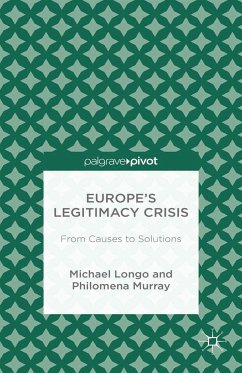
Political Allegiance After European Integration (eBook, PDF)
Versandkostenfrei!
Sofort per Download lieferbar
40,95 €
inkl. MwSt.
Weitere Ausgaben:

PAYBACK Punkte
20 °P sammeln!
How should political community be seen in the context of European integration? This book combines a theoretical treatment of political allegiance with a study of ordinary citizens, examining how taxi-drivers in Britain, Germany and the Czech Republic talk politics and situate themselves relative to political institutions and other citizens.
Dieser Download kann aus rechtlichen Gründen nur mit Rechnungsadresse in A, B, BG, CY, CZ, D, DK, EW, E, FIN, F, GR, HR, H, IRL, I, LT, L, LR, M, NL, PL, P, R, S, SLO, SK ausgeliefert werden.












